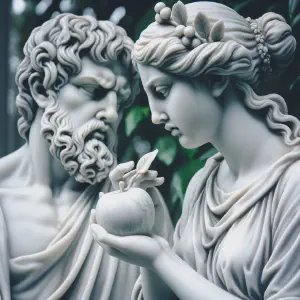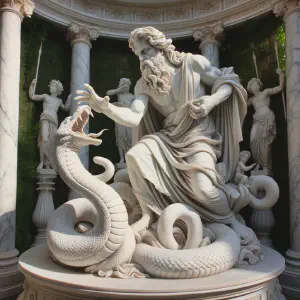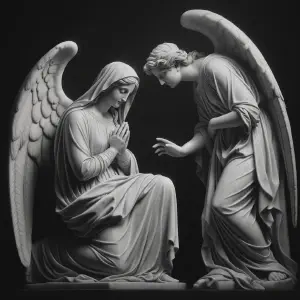The Dawning of Redemption



The Gospel of Luke recounts the Annunciation, the moment the angel Gabriel visited Mary in Nazareth. Mary, a young virgin betrothed to Joseph, received a message that would alter history. Gabriel greeted her as the favored one, chosen to bear the Son of the Most High. Troubled yet faithful, Mary questioned how this could be. Gabriel revealed the Holy Spirit’s role in the divine conception, and Mary, embracing her calling, responded with humble submission. In her acceptance, the hope foretold in Eden began to unfold, a promise of salvation and a new song of redemption for all creation.
Five Questions
What does the story of Adam and Eve’s disobedience and the resulting curse tell us about human nature and God’s response to sin?
The story of Adam and Eve illustrates the inherent weakness and susceptibility to temptation in human nature. It also shows the consequences of disobeying God, which in this case was the loss of Eden and the introduction of suffering. However, within God’s response, there is not only justice but also mercy and a promise of redemption. The curse on the serpent contains the prophecy of Christ’s victory over sin, indicating God’s plan for humanity’s salvation right from the beginning.
How does the curse on the serpent and the prophecy of the woman’s offspring crushing its head relate to the broader theme of redemption in the Bible?
This prophecy is foundational to the Christian understanding of redemption. It is often interpreted as the first hint of the coming Messiah, Jesus Christ, who would ultimately defeat sin and death. The “woman’s offspring” refers to Christ, and the act of crushing the serpent’s head is symbolic of Christ’s victory over Satan and the power of sin. This sets the stage for the entire biblical narrative, which culminates in Christ’s redemptive work.
In Paul’s letter to the Ephesians, how is the theme of predestination and adoption through Jesus Christ significant?
Paul’s message in Ephesians emphasizes the concept that believers are chosen by God and predestined to be His children through Jesus Christ. This highlights the idea of grace – that salvation is a gift from God, not something earned. It reinforces the theme of God’s sovereign will and His plan of salvation that transcends human understanding. The concept of adoption is crucial as it signifies that believers are not just servants but children of God, entitled to an intimate and personal relationship with Him.
How does the Annunciation to Mary reflect her role in God’s plan and the importance of faith?
The Annunciation to Mary showcases her critical role in God’s plan for salvation. Chosen to be the mother of Jesus, her response, “May it be done to me according to your word,” exemplifies humility and obedience. Mary’s acceptance despite her initial fear and confusion reflects the depth of her faith. This event highlights the importance of faith and trust in God’s plan, even when it seems incomprehensible or daunting.
What are the key lessons we can learn from these passages in today’s context?
These passages teach several timeless lessons. Firstly, human weakness and the need for divine grace and forgiveness, as shown in the story of Adam and Eve. Secondly, the promise of redemption and the victory over sin, as symbolized in the prophecy about the serpent. Thirdly, the concept of being chosen and loved by God, as explained by Paul. Fourthly, the importance of faith and humility in the face of God’s plans, as demonstrated by Mary. These lessons remind us of God’s enduring love, the importance of faith in overcoming life’s challenges, and the hope of salvation through Christ.
Bible Study
Genesis 3:9-15, 20
After the man, Adam, had eaten of the tree,
the LORD God called to the man and asked him, “Where are you?”
He answered, “I heard you in the garden;
but I was afraid, because I was naked,
so I hid myself.”
Then he asked, “Who told you that you were naked?
You have eaten, then,
from the tree of which I had forbidden you to eat!”
The man replied, “The woman whom you put here with me–
she gave me fruit from the tree, and so I ate it.”
The LORD God then asked the woman,
“Why did you do such a thing?”
The woman answered, “The serpent tricked me into it, so I ate it.”
Then the LORD God said to the serpent:
“Because you have done this, you shall be banned
from all the animals
and from all the wild creatures;
on your belly shall you crawl,
and dirt shall you eat
all the days of your life.
I will put enmity between you and the woman,
and between your offspring and hers;
he will strike at your head,
while you strike at his heel.”
The man called his wife Eve,
because she became the mother of all the living.
This passage details the fall of Adam and Eve, the first humans, created by God to live in obedience and harmony. After succumbing to the serpent’s temptation and eating from the forbidden tree, they face God’s questioning and judgment. Adam’s role as the first man reflects his responsibility and failure in stewardship, while Eve’s interaction with the serpent illustrates the vulnerability to deceit. The serpent, symbolic of Satan, introduces sin into the world. This event aligns with Catholic teachings on original sin, highlighting the consequences of disobedience and the loss of original holiness (Catechism of the Catholic Church 396-403). However, it also introduces the Protoevangelium, the first gospel or promise of redemption, aligning with the Catholic understanding of God’s mercy and the eventual victory over sin through Christ.
Psalm 98:1, 2-3ab, 3cd-4
R. (1) Sing to the Lord a new song, for he has done marvelous deeds.
Sing to the LORD a new song,
for he has done wondrous deeds;
His right hand has won victory for him,
his holy arm.
R. Sing to the Lord a new song, for he has done marvelous deeds.
The LORD has made his salvation known:
in the sight of the nations he has revealed his justice.
He has remembered his kindness and his faithfulness
toward the house of Israel.
R. Sing to the Lord a new song, for he has done marvelous deeds.
All the ends of the earth have seen
the salvation by our God.
Sing joyfully to the LORD, all you lands;
break into song; sing praise.
R. Sing to the Lord a new song, for he has done marvelous deeds.
Psalm 98 is a song of praise, celebrating God’s marvelous deeds and victory, symbolized through His ‘right hand’ and ‘holy arm.’ This psalm underscores God’s justice and faithfulness, especially towards the house of Israel, reflecting the Catholic value of recognizing and rejoicing in God’s salvific acts. The psalmist, traditionally believed to be King David, plays a role as a worship leader, guiding Israel and, by extension, the reader in praising God. The passage aligns with Catholic teachings on the importance of gratitude, praise, and remembrance of God’s faithfulness (Catechism 2643-2649), reinforcing the act of worship as central to the Catholic faith.
Ephesians 1:3-6, 11-12
Brothers and sisters:
Blessed be the God and Father of our Lord Jesus Christ,
who has blessed us in Christ
with every spiritual blessing in the heavens,
as he chose us in him, before the foundation of the world,
to be holy and without blemish before him.
In love he destined us for adoption to himself through Jesus Christ,
in accord with the favor of his will,
for the praise of the glory of his grace
that he granted us in the beloved.
In him we were also chosen,
destined in accord with the purpose of the One
who accomplishes all things according to the intention of his will,
so that we might exist for the praise of his glory,
we who first hoped in Christ.
Written by Paul the Apostle, this passage from Ephesians emphasizes the themes of predestination, adoption, and blessings in Christ. Paul, a key figure in early Christianity, known for his missionary journeys and theological insights, highlights God’s initiative in the salvation of humanity. The passage aligns with Catholic teachings on grace, divine election, and the universal call to holiness (Catechism 257-260, 2013-2014). It stresses the idea that grace is a gift from God, not earned by human merits, and reflects Catholic values of humility, gratitude, and the understanding of being part of God’s larger salvific plan.
Luke 1:26-38
The angel Gabriel was sent from God
to a town of Galilee called Nazareth,
to a virgin betrothed to a man named Joseph,
of the house of David,
and the virgin’s name was Mary.
And coming to her, he said,
“Hail, full of grace! The Lord is with you.”
But she was greatly troubled at what was said
and pondered what sort of greeting this might be.
Then the angel said to her,
“Do not be afraid, Mary,
for you have found favor with God.
Behold, you will conceive in your womb and bear a son,
and you shall name him Jesus.
He will be great and will be called Son of the Most High,
and the Lord God will give him the throne of David his father,
and he will rule over the house of Jacob forever,
and of his Kingdom there will be no end.”
But Mary said to the angel,
“How can this be,
since I have no relations with a man?”
And the angel said to her in reply,
“The Holy Spirit will come upon you,
and the power of the Most High will overshadow you.
Therefore the child to be born
will be called holy, the Son of God.
And behold, Elizabeth, your relative,
has also conceived a son in her old age,
and this is the sixth month for her who was called barren;
for nothing will be impossible for God.”
Mary said, “Behold, I am the handmaid of the Lord.
May it be done to me according to your word.”
Then the angel departed from her.
This passage describes the Annunciation, where the angel Gabriel announces to Mary, a virgin betrothed to Joseph of the house of David, that she will conceive Jesus, the Son of the Most High. Mary’s role as the mother of Jesus is central to Catholic theology, particularly her fiat, or ‘yes’ to God’s plan, exemplifying ultimate obedience and humility. Joseph, though not directly active in this passage, is significant as the earthly guardian of Jesus. This event aligns with Catholic teachings on the divine nature of Jesus, the importance of Mary’s role in salvation history (Catechism 484-511), and highlights themes of faith, grace, and divine providence.
Lessons
These passages collectively teach the profound lessons of faith, redemption, and hope. From the fall of Adam and Eve, we learn about human frailty and the consequences of disobedience. The curse upon the serpent and the prophecy of redemption hint at God’s plan for salvation. Paul’s letter to the Ephesians celebrates the grace and predestination in Christ, reminding us of our blessedness and calling in Him. The Annunciation to Mary underscores the importance of humble acceptance of God’s will and the power of faith. Together, these scriptures affirm God’s unfailing love and the promise of redemption, encouraging us to trust in His divine plan.
Meditation Prayer


